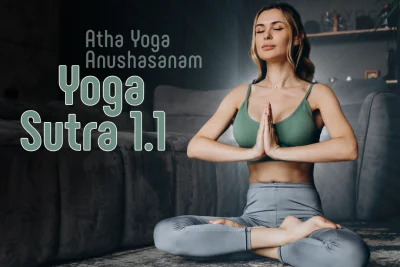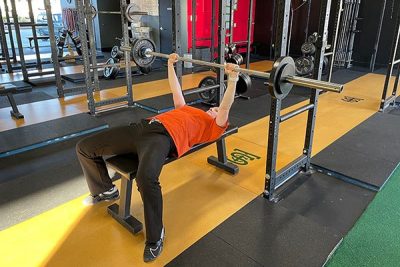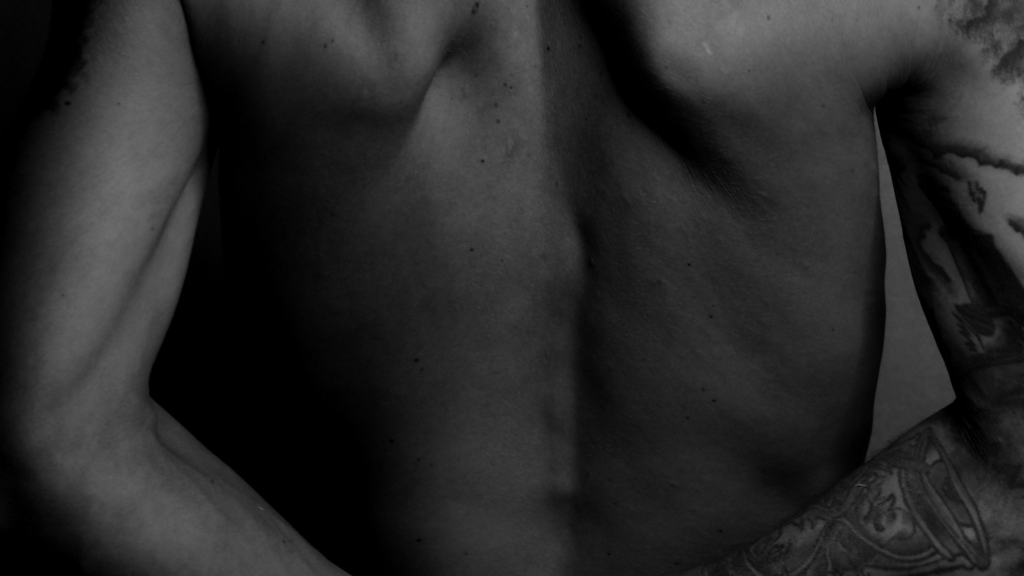
“], “filter”: { “nextExceptions”: “img, blockquote, div”, “nextContainsExceptions”: “img, blockquote, a.btn, a.o-button”} }”>
Heading out the door? Read this article on the new Outside+ app available now on iOS devices for members!
>”,”name”:”in-content-cta”,”type”:”link”}}”>Download the app.
The lower back, for lots of us, holds a fair amount of tension. Of course, the way that we sit all day massively dictates the health of our lumbar spine. But weakness in the glutes and nearby muscles is also a contributing factor. This yoga for your lower back practice both strengthens and releases the lower back and surrounding muscles so you can support your lumbar region more efficiently.
What follows is a hybrid yoga class that includes some flow along with slow stretches to strengthen and release the lumbar area, including different Bridge lifts and a fair amount of elevated side-lying lifts. You’ll also stand a little in the poses although most of the exercises are floor work.
It doesn’t matter that the practice isn’t an entire hour. You’ll do done more for your lower back in those 18 minutes than if you’d spent the same amount of time procrastinating on making yourself go to the studio.
18-Minute Yoga for Lower Back Practice
You’ll need at least one block or a small stack of books for some of these poses.
Low Bridge Lifts
Take your time as you come down on your back. Give yourself a moment to get down here and then bend your knees and plant your feet on the mat to start. You’re going to gently push down through your feet and take your hands to the fronts of your pelvis, the boney parts that stick out a little, known as your anterior superior iliac spine. I want you to hold on to those. Take your hands a little outside your hips and just rest your thumbs on the boney parts.
From here, lift yourself into a really low Bridge Pose, almost as if the back of the pelvis is still almost touching the floor. There’s literally just enough space to slide your hand between your back and the mat. Then tuck your tailbone underneath you slightly to roll the pelvic points more toward your chest. Keep this slight scooping under and stay here. This stretches the muscles across the back of the pelvis and strengthens the glutes.
This low pelvic place is where we’re going to stay as you gently swing your pelvis from side to side. So your hips are moving from right to left but you still have this slight tuck of the tailbone.
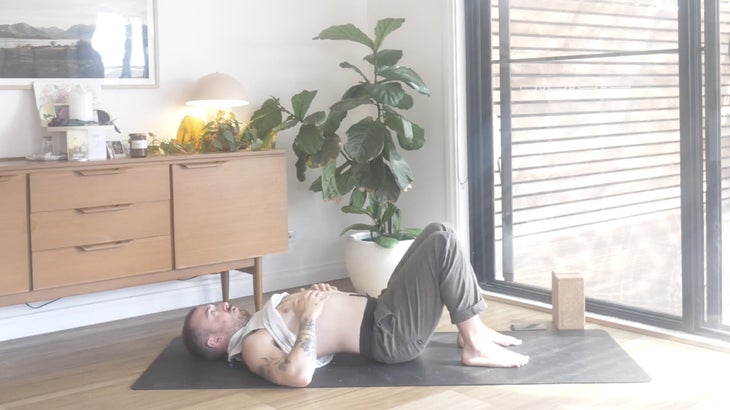
Cat-Cow in Bridge Pose
Slowly lower your pelvis to the mat. Let the natural curvature happen at the low back. It will almost feel like your ribs are jutting up toward the ceiling.
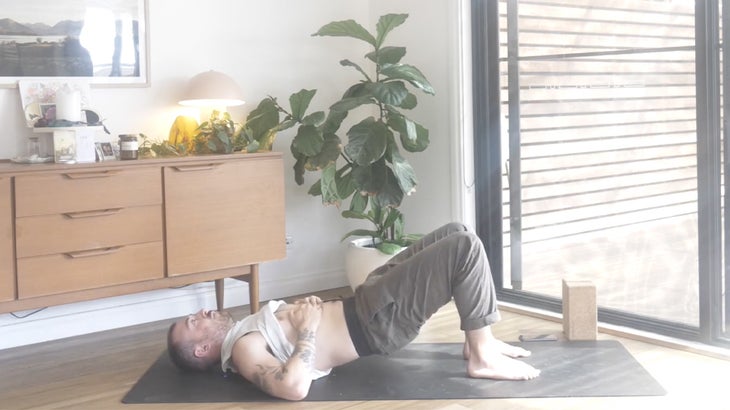
Then draw your ribs down toward the mat, feel the back of your body flatten, and then tuck the tail under and round and lift your lower back.
Rock back and forth like that a few times. So your pelvis lowers and the ribs pop up to the sky and then your pull the ribs down to the mat as you tuck the tailbone. This is going to bring a little more space into that lower and mid back. Don’t worry if you can’t get the movement. It might feel a little jammed and that’s fine.
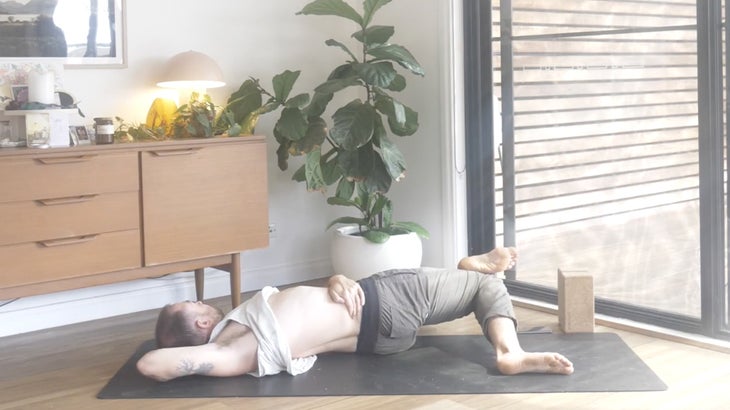
Figure 4 Stretch
Bring your left foot to your right thigh for a figure-four shape and then lower your knees to the left for a twist. Slowly come back to center and switch sides.
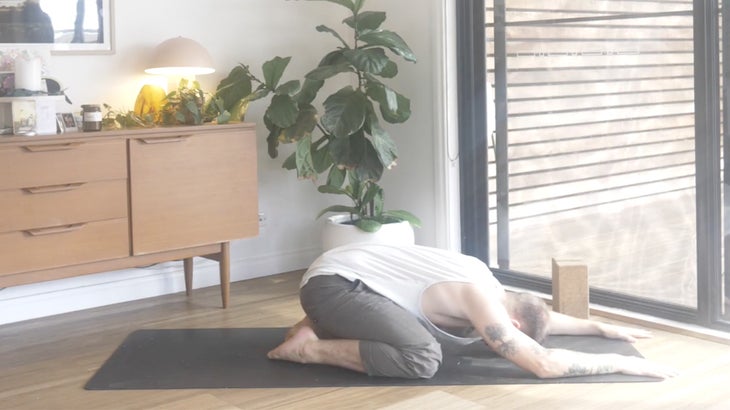
Child’s Pose
From your Figure 4, take yourself back through to center, unhook your legs, and bring your knees to your chest, and maybe give yourself a squeeze. Then rock yourself forward and backward and bring yourself all the way up and over or roll onto one side and make your way onto hands and knees. Bring your knees apart and sit your hips back into Child’s Pose.
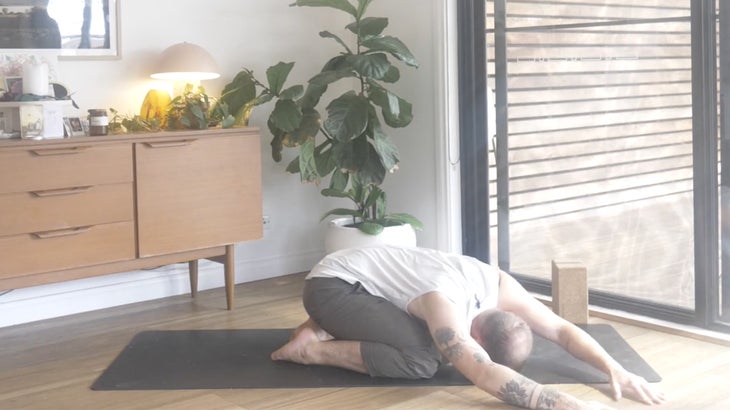
To get more of a side stretch, walk your hands to the right, take a couple deep breaths here, and then walk your hands off to the left.
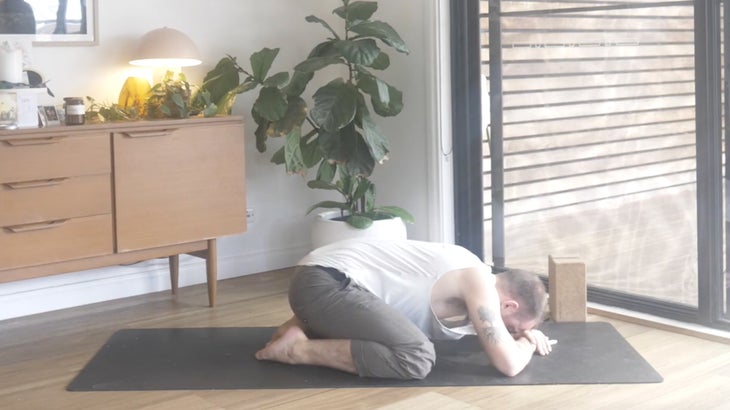
Then bring your hands back to center. Stack your hands underneath your forehead and give yourself a moment there. Send the breath down the base of the pelvis and almost feel like you can find a little more space in the area around the sides of your body. Take at least one full breath here.
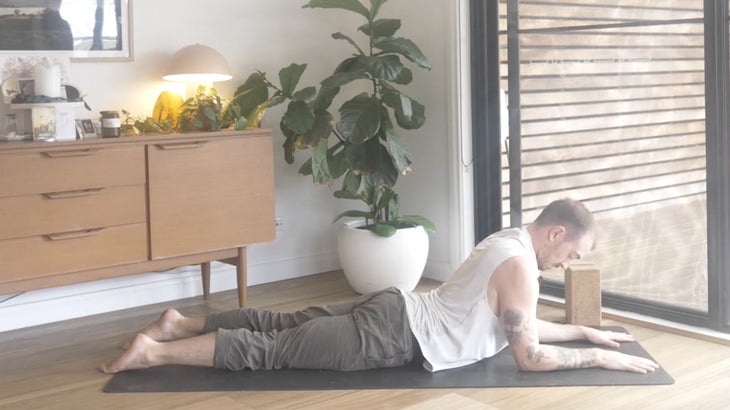
Sphinx Pose
Slowly come onto your forearms and slide your legs straight back, one at a time, as you come into Sphinx Pose. This will bring a little compression to your lower back. Compression is not a bad thing. When it’s done gently, it’s fine. It’s when we compress things really hard or continually that’s not a good thing.
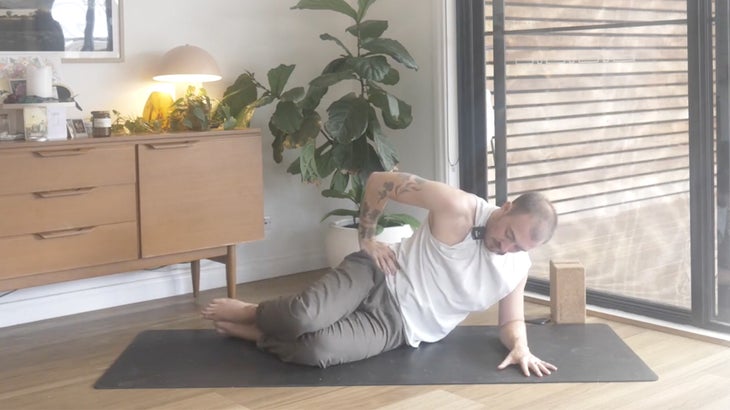
Side-Lying Leg Lifts
Take a slow breath out in Sphinx Pose and bring your left forearm across your mat, like you’re reaching for your right wrist or right elbow, and then roll onto your left hip. Now bend your knees, so you’re in a side-lying position.
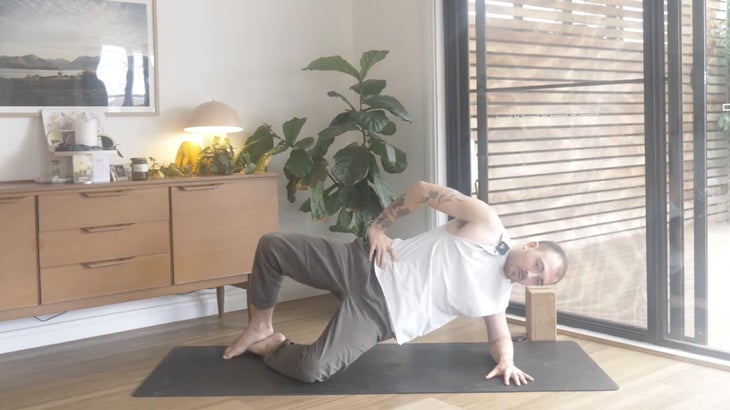
Push your left forearm into the mat. Now keep that engagement and elevate your top leg toward the ceiling and then lower it. Repeat that a few times. You should feel it in this top outer glute. You can intensify things by lifting your bottom hip off the mat as you lift your top leg.
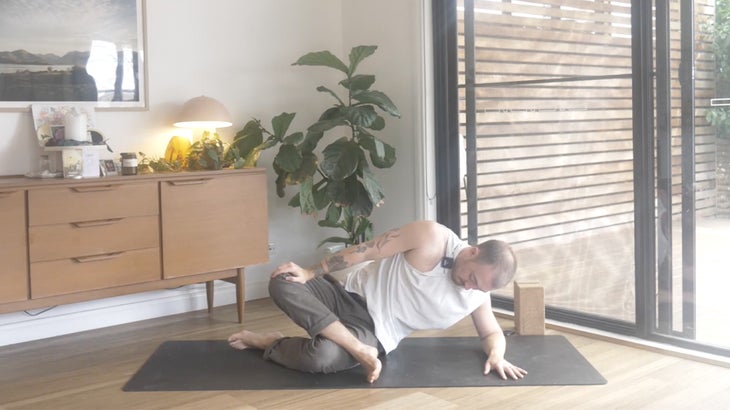
Cow Face Legs
The next time that you lower down, let yourself stay there. Bring your right foot in front of your left thigh in a figure-4 fashion and gently press your right hand against your top thigh to intensify the stretch. Stay here for a breath.
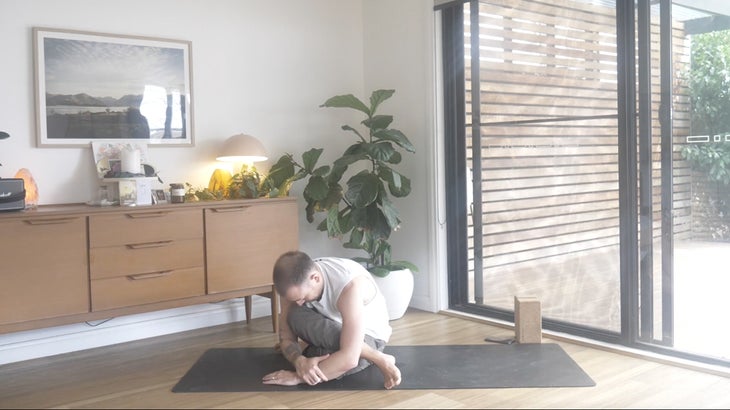
Then keep the legs as they are while you push your left forearm into the mat and come to a seated position that’s somewhat similar to Cow Face Pose. Honestly, it doesn’t matter where you are on the mat or what exactly it looks like. Then simply fold yourself forward over your top leg in a seated forward bend. Take several full breaths here.
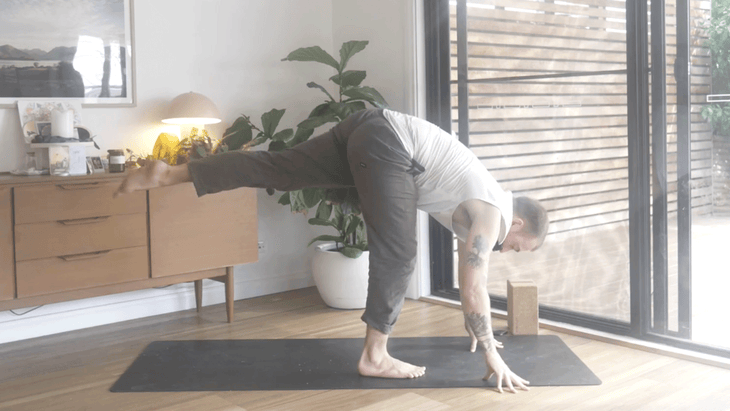
Standing Splits
Bring your hands to face the front of the mat, shoulder distance apart, and shift your weight onto your left hip. Come into standing splits by standing on your right leg and lifting your left leg off the mat behind you. Tap your left foot down behind you toward the right back side of the mat, and then lift your left leg again and tap it over to the left side. Repeat a couple of times.
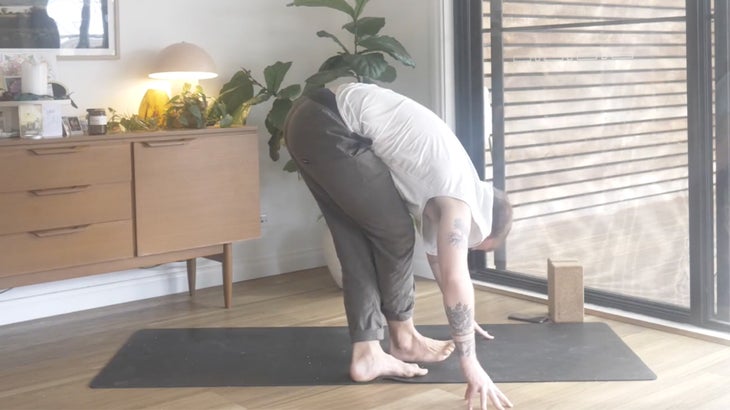
Standing Forward Bend With IT Band Stretch
The next time your left foot crosses behind your right, let yourself stay here in a cross-legged forward fold. The exact placement of your feet really doesn’t matter.
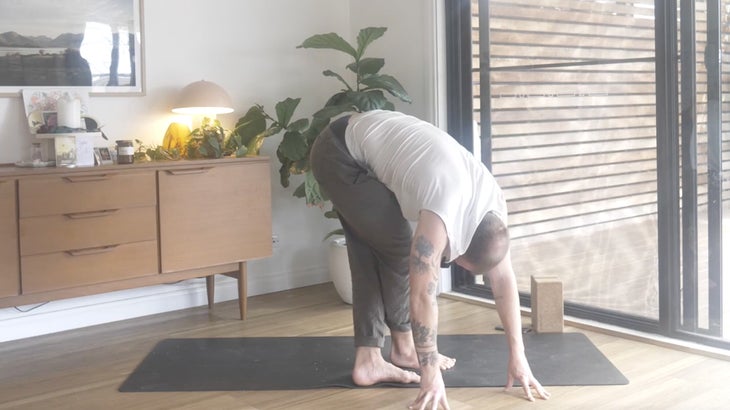
Then walk your hands off to the right. Breathe here.
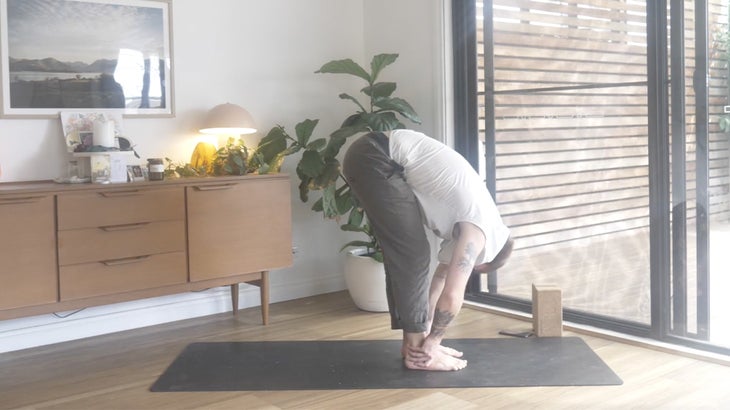
Standing Forward Bend
Bring your hands to the center and just step left foot to meet the right in a Standing Forward Bend. Pause here as you release your neck and shoulders.
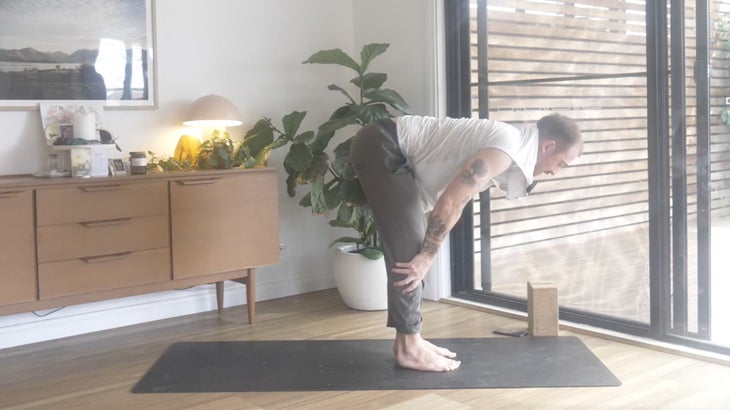
Standing Half Forward Bend
Now take a halfway lift, lengthening out from the spine and taking your hands to your shins, thighs, or blocks. Create some space.
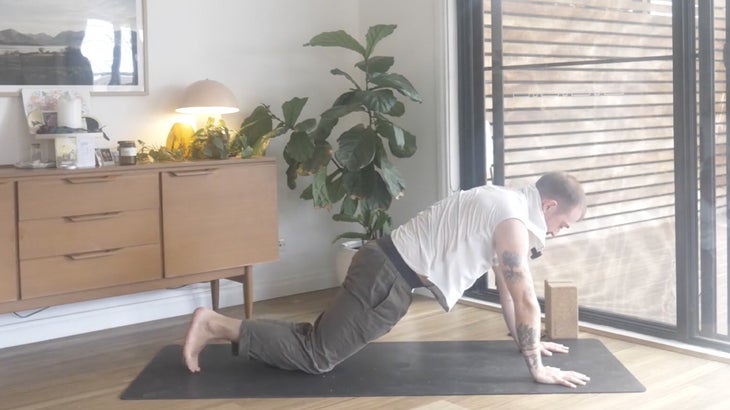
Plank Pose
Plant your hands on the mat beneath your shoulders and step back to Plank Pose and lower your knees. Then come down onto your forearms and back into Sphinx Pose for a breath. I don’t know about you, but my low back is already feeling different.
Repeat the sequence on your other side, starting with taking your right hand to your left elbow and turn onto your right hip. After you’ve completed the poses, come back to Sphinx and let yourself stay there for a slow breath out.
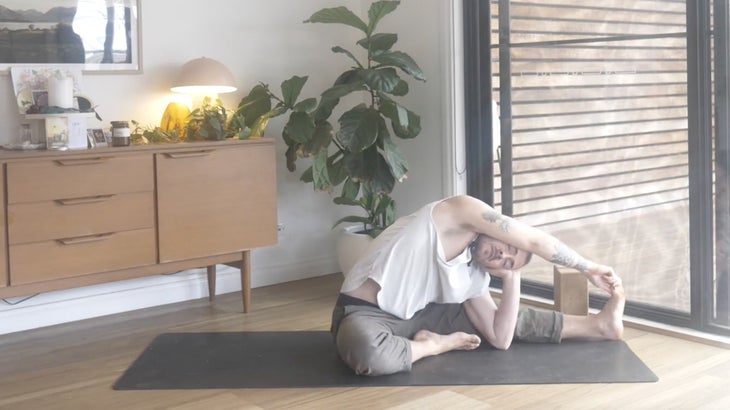
Seated Side Bend
Roll yourself onto one hip so you can swing your legs all the way in front of you. You’re going to take a little side bend during your forward bend. Your left leg is straight and your right knee is bent with your right foot against your left thigh. Reach up and over to the left as you lean to the side over your left leg for a little pull along the right side of your lower back. You don’t have to grab your left foot. You might want to bend your right elbow and wrap your right arm behind your low back. Breathe here.
Switch sides so your right leg is straight and your left arm reaches up and over.
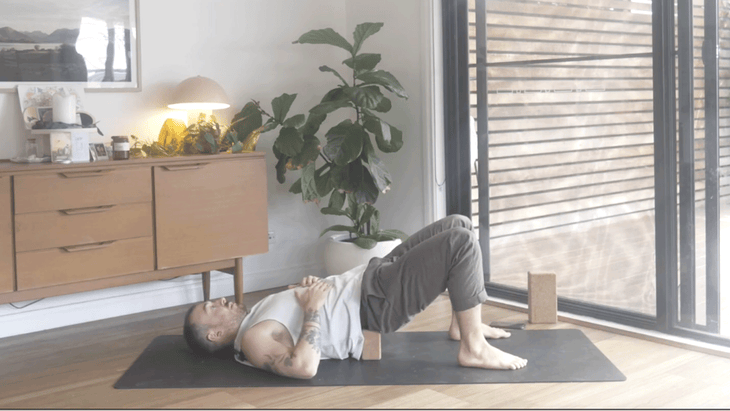
Supported Bridge Pose
Come into a Supported Bridge Pose with the block underneath the sacrum. You can stay here and choose to rest, if you like.
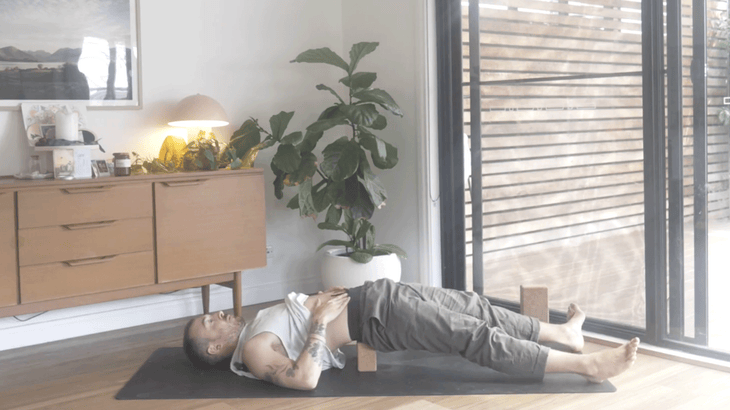
You might want to extend your legs straight out and toward the far corners of the mat, which will pull a little more through the front of your hips.
Stay here for a while longer or come out of Supported Bridge and rest on your back in Savasana for a while.
Practice this and other stretching and strengthening yoga sequences with Angus Knott through his online classes.

